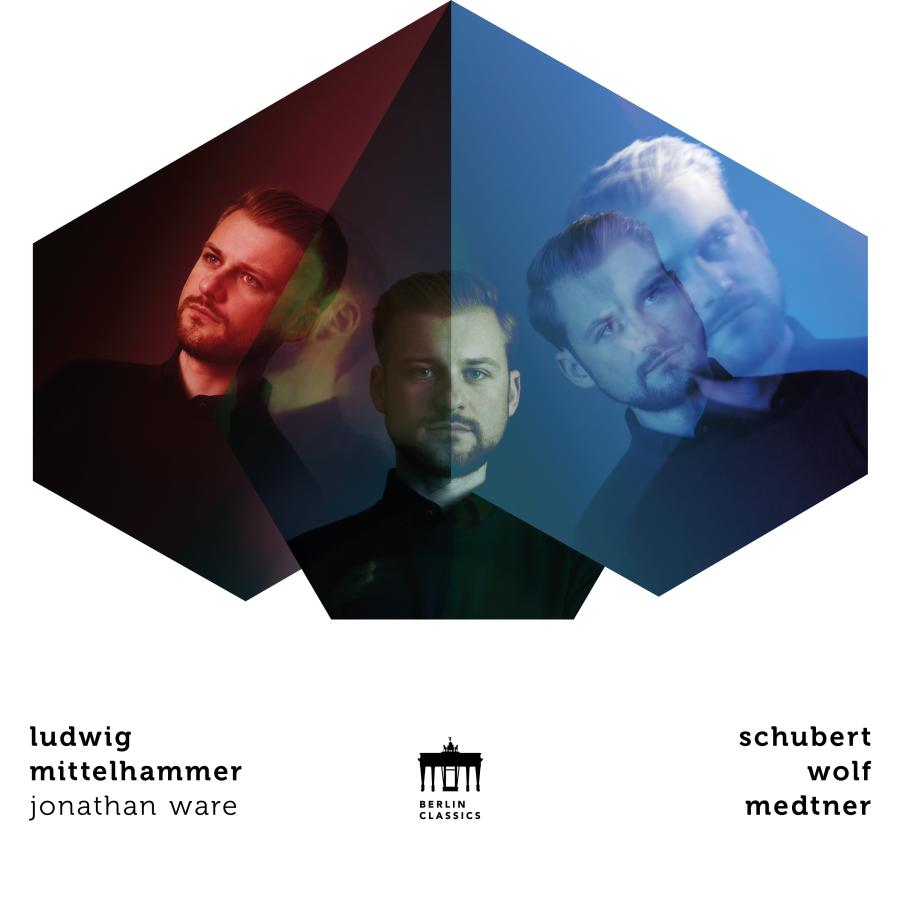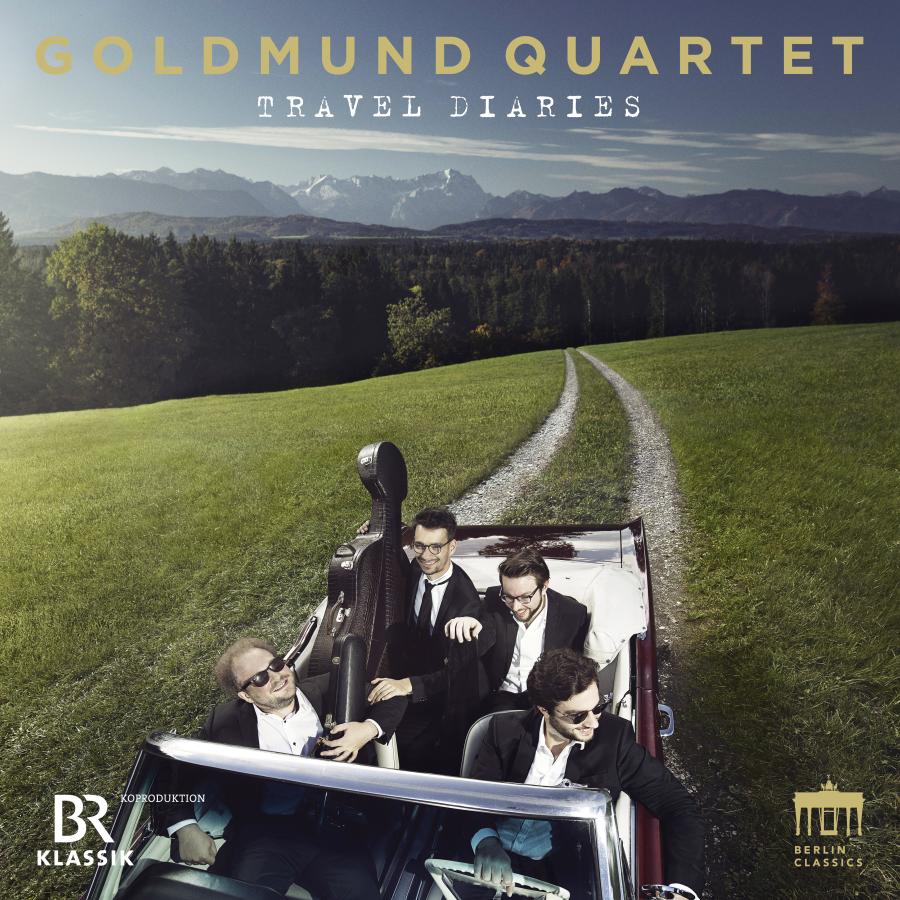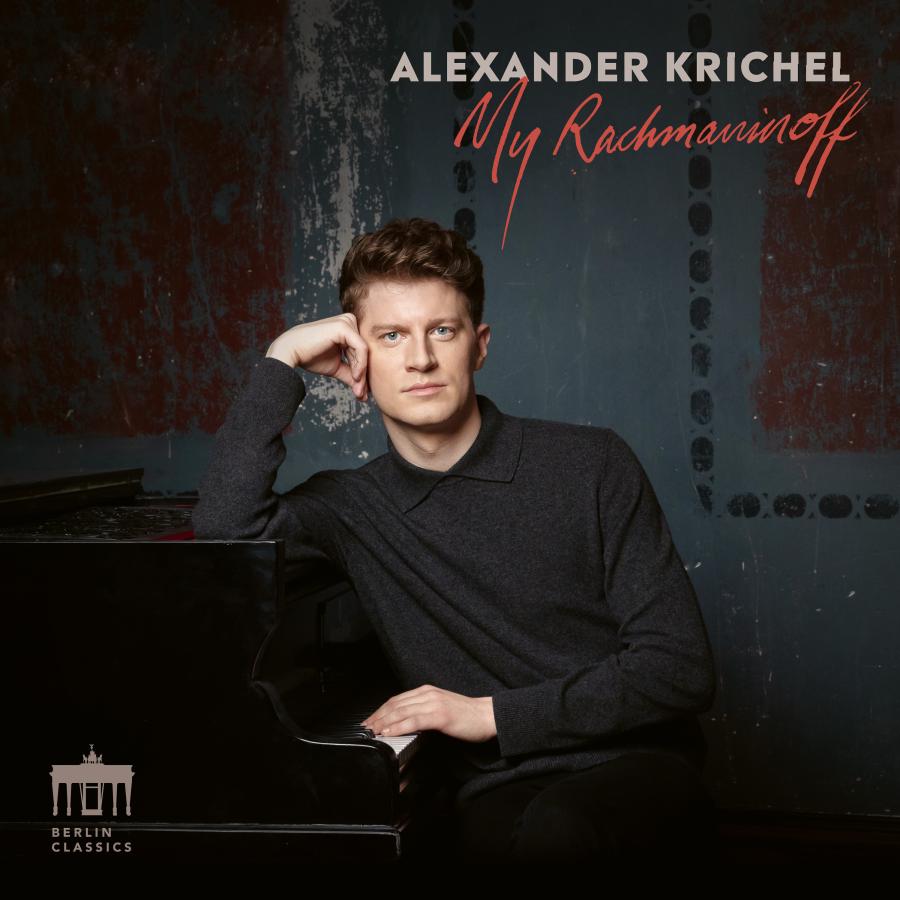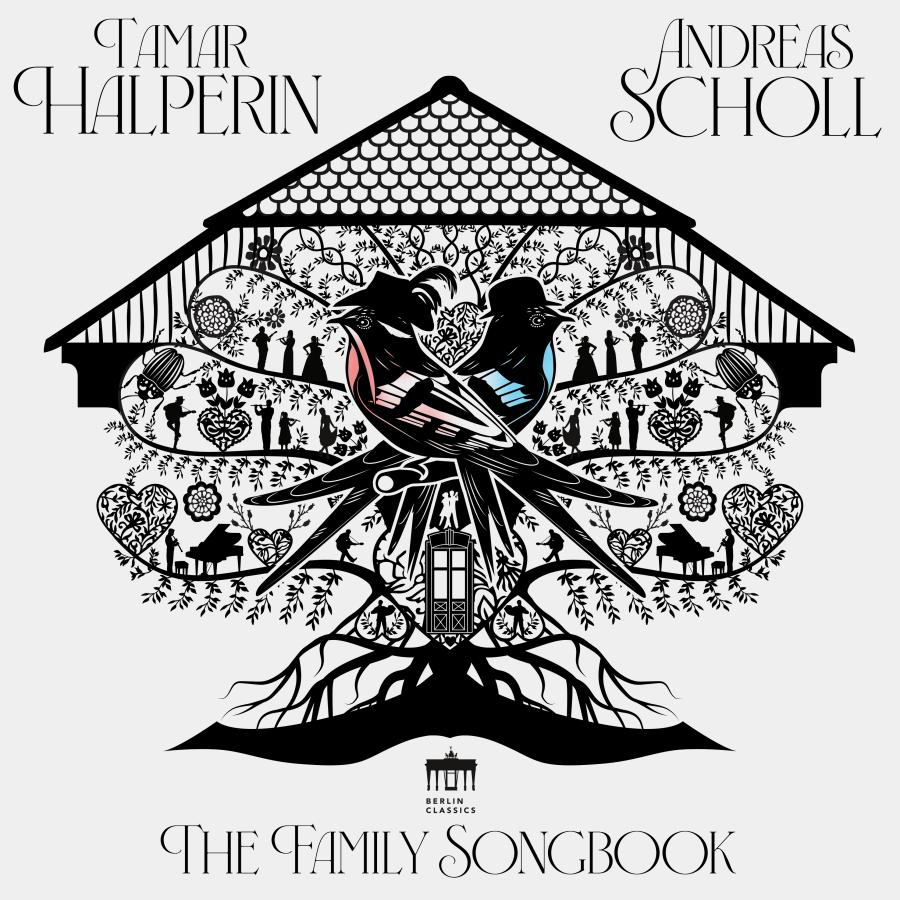They modestly call themselves “little guys” (lat. salaputia), and yet they know outrageously well how to create thematically sophisticated programs and make music at the highest level. Having already released four albums, the 12 likeable musicians of the young brass ensemble Salaputia Brass are now presenting their debut album on Berlin Classics. Chansons sans paroles is a compilation of 34 songs from the rich history of French chanson. The original adaptations and new arrangements are convincing even without lyrics. The singing is given over to the wind instruments of the ensemble, whose members hold various solo positions in top German orchestras (Konzerthausorchester Berlin, Staatskapelle Dresden, Gewandhausorchester Leipzig, Symphonieorchester des Bayerischen Rundfunks, Philharmonisches Staatsorchester Hamburg).
The translation of the album title “Songs without words” inevitably brings Felix Mendelssohn Bartholdy to mind. His song-like character pieces were intended to inspire the imagination purely instrumentally. The same applies to Chansons sans paroles. “After our programs with symphonic and folk sounds, a lighter, floating, more colourful mixture of sounds needed to follow,” explains Peter Dörpinghaus, trumpeter in the ensemble. “We are trying to break new ground,” continues his ensemble colleague Felix Baur (horn). “This album is not intended to be a typical popular hit. Rather something for the ears and head.” Even without prior knowledge of the original chanson lyrics, this music does not fail to make an impact.
Salaputia Brass go beyond the pure brass spectrum and include percussion instruments and melodically tuned mallet instruments. Already in the opener “So ist Paris”, a drumset is clearly one of the driving forces. The medley goes straight to the heart of all chanson lovers and contains other catchy tunes such as “Les Champs-Elysées” and “La vie en rose”. The arrangements by Heinz Bröcker have been skillfully arranged by Martin Wagemann (solo trumpeter in the orchestra of the Deutsche Oper Berlin).
The album is divided into four major sections, divided by three sensitive arrangements by Peter Dörpinghaus: “Après une rêve” and “Au bord de l’eau” by Gabriel Fauré as well as “Vocalise-ètude en forme de Habanera” by Maurice Ravel. The first of these sections is dedicated to works by the French artists’ group “Groupe des Six”. By using mutes and a variety of different instruments, Peter Dörpinghaus lends his arrangements new timbres. Particularly vivid examples are “Rosemonde” by Arthur Honegger or “Romance sans paroles” by Louis Dureys.
The next section is also richly colorful in sound. The “Sept Chansons” by Francis Poulanc, shine in a whole new light. “Our sound engineer Thomas Bößl, who knows the cycle from his days singing in a choir, almost didn’t recognize some of the pieces,” smiles Peter Dörpinghaus.
The next section opens up a sublime world of sound with Renaissance works such as Pierre Passereau’s “Il est bel et bon”, Orlando di Lasso’s “Bonjour mon coeur”, Pierre Sandrin’s “Dulce mémoire” or Pierre de Manchicourt’s “Faulte d’argent”. The seven chansons by Erik Satie “Chansons de Caf’ Conc'” form the last part of the album. The charming arrangements by Rainer Hoffmann (bass trombonist in the Frankfurt Opera and Museum Orchestra and arranger) demonstrate originality. A special musical guest here is the well-known singer Max Raabe, who whistles the melody to “Les Oiseaux”.
Fun fact: one piece on the album was only written during the recording process. After the French composer Thierry Escaich (*1965) had listened to the first recordings, he adapted Pierre Sandrin’s “Puisque vivre en servitude” into his “Old Song”.
The album comes to a lively close with a hit-song by the Nouvell chanson singer Zaz, “Je veux” (I want) in a charming arrangement by Swedish trombonist and arranger Lars Karlin. Chansons sans paroles spans a wide historical arc and leads from the Renaissance madrigals to the present day. The expressive power of the wind instruments in this stylistic range is impressive and makes you want more!
Chansons sans paroles Salaputia Brass
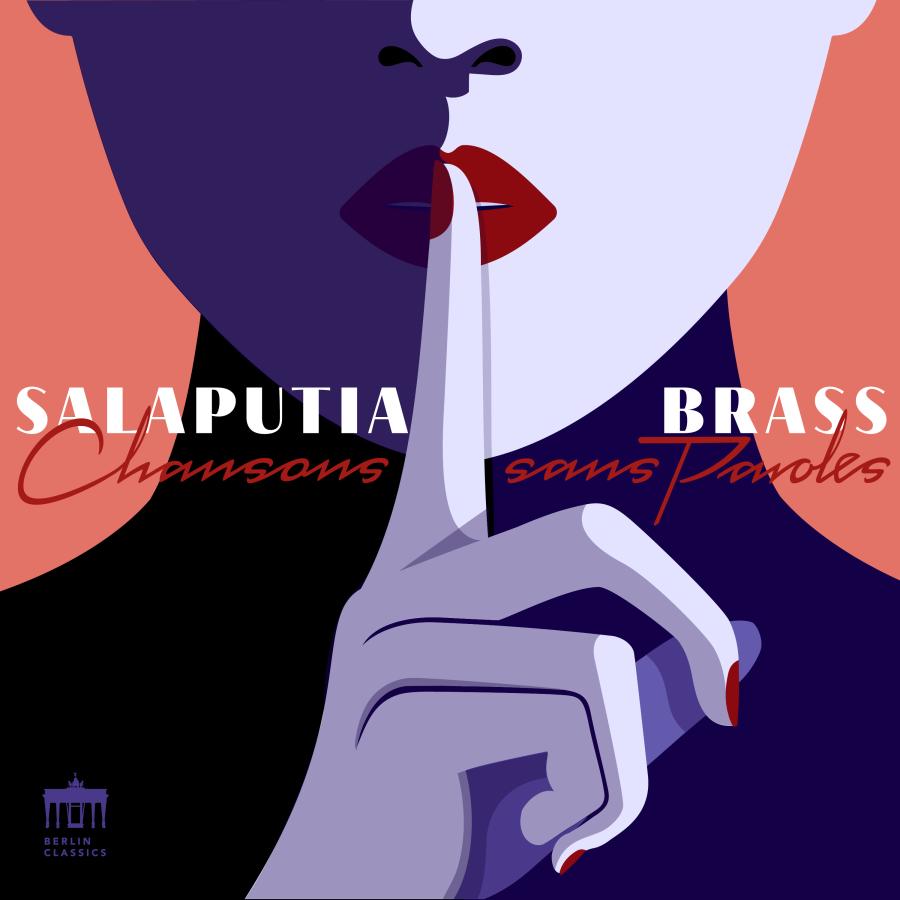
Artist

Composer





Further information
Genre
Klassik
Musik für Kammerensemble
Blechbläserensemble
Publication date
10.05.2024
They modestly call themselves "little guys" (lat. salaputia), and yet they know outrageously well how to create thematically sophisticated programs and make music at the highest level. Having already released four albums, the 12 likeable musicians of the young brass ensemble Salaputia Brass are now presenting their debut album on Berlin Classics. Chansons sans paroles is a compilation of 34 songs from the rich history of French chanson. The original adaptations and new arrangements are convincing even without lyrics. The singing is given over to the wind instruments of the ensemble, whose members hold various solo positions in top German orchestras (Konzerthausorchester Berlin, Staatskapelle Dresden, Gewandhausorchester Leipzig, Symphonieorchester des Bayerischen Rundfunks, Philharmonisches Staatsorchester Hamburg).
The translation of the album title "Songs without words" inevitably brings Felix Mendelssohn Bartholdy to mind. His song-like character pieces were intended to inspire the imagination purely instrumentally. The same applies to Chansons sans paroles. "After our programs with symphonic and folk sounds, a lighter, floating, more colourful mixture of sounds needed to follow," explains Peter Dörpinghaus, trumpeter in the ensemble. "We are trying to break new ground," continues his ensemble colleague Felix Baur (horn). "This album is not intended to be a typical popular hit. Rather something for the ears and head." Even without prior knowledge of the original chanson lyrics, this music does not fail to make an impact.
Salaputia Brass go beyond the pure brass spectrum and include percussion instruments and melodically tuned mallet instruments. Already in the opener "So ist Paris", a drumset is clearly one of the driving forces. The medley goes straight to the heart of all chanson lovers and contains other catchy tunes such as "Les Champs-Elysées" and "La vie en rose". The arrangements by Heinz Bröcker have been skillfully arranged by Martin Wagemann (solo trumpeter in the orchestra of the Deutsche Oper Berlin).
The album is divided into four major sections, divided by three sensitive arrangements by Peter Dörpinghaus: "Après une rêve" and "Au bord de l'eau" by Gabriel Fauré as well as "Vocalise-ètude en forme de Habanera" by Maurice Ravel. The first of these sections is dedicated to works by the French artists' group "Groupe des Six". By using mutes and a variety of different instruments, Peter Dörpinghaus lends his arrangements new timbres. Particularly vivid examples are "Rosemonde" by Arthur Honegger or "Romance sans paroles" by Louis Dureys.
The next section is also richly colorful in sound. The "Sept Chansons" by Francis Poulanc, shine in a whole new light. "Our sound engineer Thomas Bößl, who knows the cycle from his days singing in a choir, almost didn't recognize some of the pieces," smiles Peter Dörpinghaus.
The next section opens up a sublime world of sound with Renaissance works such as Pierre Passereau's "Il est bel et bon", Orlando di Lasso's "Bonjour mon coeur", Pierre Sandrin's "Dulce mémoire" or Pierre de Manchicourt's "Faulte d'argent". The seven chansons by Erik Satie "Chansons de Caf' Conc'" form the last part of the album. The charming arrangements by Rainer Hoffmann (bass trombonist in the Frankfurt Opera and Museum Orchestra and arranger) demonstrate originality. A special musical guest here is the well-known singer Max Raabe, who whistles the melody to "Les Oiseaux".
Fun fact: one piece on the album was only written during the recording process. After the French composer Thierry Escaich (*1965) had listened to the first recordings, he adapted Pierre Sandrin's "Puisque vivre en servitude" into his "Old Song".
The album comes to a lively close with a hit-song by the Nouvell chanson singer Zaz, "Je veux" (I want) in a charming arrangement by Swedish trombonist and arranger Lars Karlin. Chansons sans paroles spans a wide historical arc and leads from the Renaissance madrigals to the present day. The expressive power of the wind instruments in this stylistic range is impressive and makes you want more!
Tracklist - These are the tracks you will hear on the album
Chansons sans paroles
Salaputia Brass
1
So ist Paris
2
Paris Canaille
3
No. 1, Après une rêve
4
On a dit mal de mon ami
5
No. 4, Comme un verre de Venise
6
No. 1, Mon Histoire
7
No. 5, Rosemonde
8
Romance sans paroles, Op. 21
9
No. 1, Fumée
10
No. 3, École de guerre
11
No. 2, Fêtes galantes
12
No. 1, Au bord de l'eau
13
I. La blanche neige
14
II. A peine défigurée
15
III. Par une nuit nouvelle
16
IV. Tous les droits
17
V. Belle er ressemblante
18
VI. Marie
19
VII. Luire
20
Bon jour mon coeur, bon jour ma douce vie
21
Dulce mémoire
22
Puisque vivre en servitude
23
Il est bel et bon
24
Ce qui m'est deu et ordonné
25
Faulte d'argent
26
Old Song
27
Vocalise-ètude en forme de Habanera
28
Allons-y chochotte
29
Chez le docteur
30
Je te veux
31
La diva de "l'Empire"
32
L'omnibus automobile
33
Les Oiseaux
34
Tendrement
35
Je veux
















![Salaputia Brass - Je veux (Arr. für Brass Ensemble) [Offizielles Musikvideo] Salaputia Brass - Je veux (Arr. für Brass Ensemble) [Offizielles Musikvideo]](https://img.youtube.com/vi/jcru50KZdfw/default.jpg)

